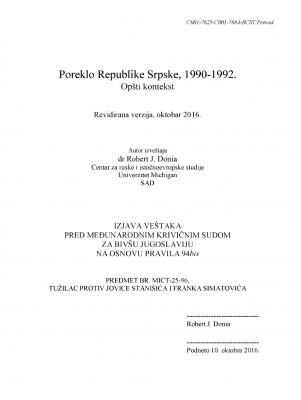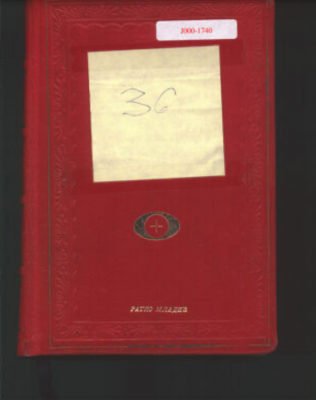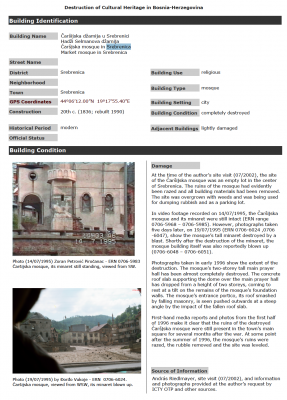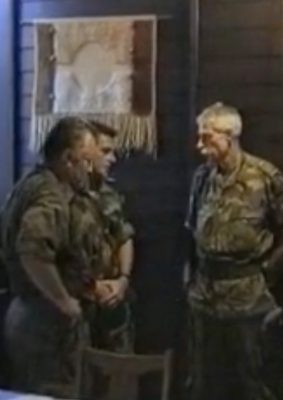
In July 2025, the world will mark thirty years since the genocide in Srebrenica occurred. The Srebrenica Genocide is an atrocity that remains the gravest crime committed on European soil since the Second World War. Srebrenica 1995–2025 is a long-term commemorative and educational project of UConn’s ICTY Digital Archives designed to honor the victims and survivors while deepening public understanding of the genocide and its lasting impact. By bringing together critical legal records, survivor testimony, and cultural memory, the project reflects on the enduring legacy of those events and the continued urgency of remembrance as a tool in transitional justice.
The International Criminal Tribunal for the former Yugoslavia (ICTY) has legally recognized the Srebrenica massacre as genocide, and much of the evidence underpinning that judgment is preserved in our existing ICTY Digital Archives. This special feature collection is a continuation of the ICTY public records and gathers key materials specifically related to the genocidal events of July 1995. The featured ICTY Digital Archives collection records draw primarily from the ICTY’s Unified Court Records, an extensive body of legal evidence, testimonies, and findings that document the genocide in detail.
Alongside official court materials, the collection includes a wider range of sources: scholarly articles, books, films, podcasts, images, and other media that continue to tell the story of Srebrenica and trace its enduring impact nearly three decades later.
The Dodd Impact Programs and the Gladstein Family Human Rights Institute’s ICTY Digital Archives is privileged to have the opportunity not only to offer a Srebrenica Genocide commemoration for 2025, but also to introduce a living archive. The Srebrenica 1995–2025 project is designed to evolve over time, growing through continued research and contributions to ensure that the memory of Srebrenica remains active, accessible, and instructive for generations to come.
Srebrenica and the ICTY
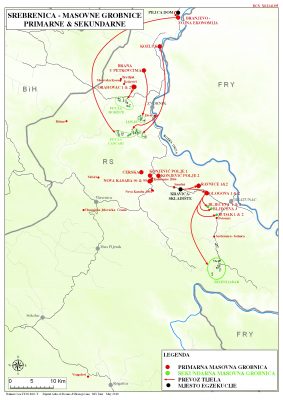
The International Criminal Tribunal for the former Yugoslavia (ICTY) played a crucial role in uncovering the truth about the Srebrenica Genocide and delivering justice for its victims. Established by the UN in 1993, the ICTY was the first international war crimes court of its kind since Nuremberg, and it focused extensively on investigating the atrocities committed during the Yugoslav Wars—including the 1995 Srebrenica Genocide, the worst mass killing in Europe since World War II. Through extensive trials, the Tribunal proved beyond a reasonable doubt that Bosnian Serb and associated forces executed between 7,000 and 8,000 Bosnian Muslim men and boys in a premeditated campaign of genocide. Groundbreaking evidence, including intercepted communications, forensic analysis of mass graves, and firsthand testimony, was used to dismantle denial and misinformation surrounding the events. Notably, in the trial of Slobodan Milošević, shocking video evidence of the Scorpions paramilitary unit executing six prisoners forced public acknowledgment of the crimes. The ICTY convicted 16 individuals for their roles in the Srebrenica massacre, including high-ranking political and military officials such as Radovan Karadžić, the former President of Republika Srpska and Supreme Commander of its armed forces; General Ratko Mladić, the former Commander of the Main Staff of the Army of Republika Srpska; and General Radislav Krstić, Commander of the Drina Corps of the Army of Republika Srpska, who was the first person to be convicted of genocide in relation to Srebrenica. Several other prominent figures involved in the events of July 1995 were also held accountable. These rulings not only delivered justice but also established a historical record, countering revisionist narratives and emphasizing the importance of accountability in post-conflict societies and at-risk populations.
You can explore additional ICTY resources related to the Srebrenica Genocide below.
ICTY resources related to the Srebrenica Genocide
Srebrenica: Genocide – No Room for Denial (Documentary)
Bridging the Gap with Local Communities – Srebrenica
Justice in Transition: The Srebrenica Cases (PDF overview)
In commemoration of the 20th year since the Srebrenica Genocide, the United Nations International Residual Mechanism for Criminal Tribunals (IRMCT) curated a comprehensive collection in 2015 of materials from the International Criminal Tribunal for the former Yugoslavia (ICTY).
This resource includes a detailed timeline covering key events before, during, and after the genocide.
ICTY Witness Testimonies Regarding Srebrenica
Witness DD is a Bosnian Muslim woman who testified on July 26th 2000, in the case against Radislav Krstić. She speaks about losing her husband and two sons, who were killed in the Srebrenica genocide. Her name and identity were withheld from the public.
Mirsada Malagić is a Bosnian Muslim woman who testified on the 3rd and 4th of April 2000, in the case against Radislav Krstić and on the 16th of February 2011 in the case against Zdravko Tolimir. She speaks about the experience of women whose husbands were killed in Srebrenica.
Witness O is a survivor of the Srebrenica genocide who speaks about its perpetrators. He was 17 years old in 1995. Witness 0 testified with his name and identity withheld on April 13th 2000 in the trial of Radislav Krstić.
View the ICTY Digital Archives Records
We are pleased to introduce The Srebrenica Genocide Archives Collections as the newest addition to the UConn ICTY Digital Archives. This significant collection offers a crucial perspective on the documentation and investigation of the Srebrenica Genocide, further strengthening the archive’s role in advancing research, education, and public understanding of both the events at Srebrenica and their broader implications for international criminal justice.
You can explore The Srebrenica Genocide Archives Collections through the Connecticut Digital Archives (CTDA) or browse selected highlights alongside other featured collections below.
In addition to the newly launched Srebrenica Genocide Archives Collections, the UConn ICTY Digital Archives also offer curated access to select records from previously established collections that illuminate the work of the International Criminal Tribunal for the Former Yugoslavia (ICTY), with a particular focus on documenting and understanding the Srebrenica Genocide. Among these are materials drawn from these key archival collections:
-
The Robert J. Donia Collection Records
-
The Predrag Dojčinović Collection Records
-
The András Riedlmayer Collection Records
-
The Dan Saxon Collection Records
These collections provide unique insights into the evidentiary, cultural, and historical dimensions of the genocide and its prosecution.
Explore the full range of Srebrenica-related archival materials through our curated ICTY Digital Archives by visiting the dedicated page on the Connecticut Digital Archives (CTDA) or browse selected highlights from the four featured archival collections below.
In case you experience technical difficulties accessing any collections, please contact us here.
Additional Resources
To provide deeper insight and context about the Srebrenica genocide, we invite visitors to explore a selection of additional resources that offer historical documentation, survivor testimonies, and interactive educational tools.
A comprehensive collection of open-source materials can be found through Archive.org’s Srebrenica related records, which includes videos, documents, and reports related to the events and aftermath of the Srebrenica Genocide.
The SENSE Centar’s Srebrenica page presents a detailed multimedia narrative of the genocide, based on ICTY findings and courtroom evidence.
For a visual exploration, the Bitter Land interactive map provides a powerful representation of mass graves and key locations connected to the genocide, offering a sobering geographic context to the atrocities committed. These resources are essential for those seeking to understand and remember the tragic events of July 1995.
The Remembering Srebrenica Virtual Museum is a collaboration between Al Jazeera Balkans and Remembering Srebrenica UK, this virtual museum provides a 360-degree tour of the Srebrenica-Potocari memorial complex and cemetery to visitors from around the world. The virtual museum functions as a digital space of remembrance for the victims of the genocide and allows visitors from all over the world to visit the memorial complex. It also provides access to a variety of resources such as survivor testimonies a collection of selected documentary films, television reports, interviews, and artistic reflections about the genocide.
Documenting the experience of children during the Srebrenica genocide
The War Childhood Museum and the Srebrenica Memorial Center formed a partnership to document the Srebrenica genocide and its long-lasting consequences from the perspective of those who were impacted during their childhood. The project collected 100 testimonies - some of the testimony recorded as part of the project has been made available online in video format and 14 personal stories from these survivor testimonies were published online as part of the museum’s #ChildrenAndGenocide campaign.
The Children of Srebrenica is an organisation which is dedicated to keeping alive the memory of the genocide’s victims and which has collected the stories of children who survived the genocide.
Survivor testimonies
For the project “The Lives Behind the Fields of Death” the Srebrenica Memorial Center and the Balkan Investigative Reporting Network Bosnia and Herzegovina filmed 100 testimonies from surviving witnesses of the Srebrenica genocide. The project gives space to families of victims to share stories about those killed in the genocide and links their testimonies to items in the museum’s collection which have been donated by genocide survivors. The video content produced for the project is part of a permanent exhibit displayed at the Memorial Center in Potocari and is also made available online to enable visitors from around the globe to hear the survivor’s testimonies and to contribute to the project’s goal of countering the denial of genocide and discrimination.
Remembering Srebrenica is a UK-based charitable initiative which seeks to keep the memory of the victims of Srebrenica alive and which provides educational visits that seek to promote social action with a goal of building safer and more cohesive communities. Remembering Srebrenica has collected and published the stories of Srebrenica genocide survivorsand has also developed a podcast ‘Untold Killing’ in co-production with Message Heard, which raises awareness about the genocide and provides survivors with a platform to share their stories in their own words.
Connecticut State Records
In recognition of the importance of remembrance and education, the Connecticut General Assembly passed SB 0384 in 2023, officially designating July 11th as Bosnian Genocide Remembrance Day. Full legislative records are available through the Connecticut Digital Archive, made possible by the Connecticut State Library. This designation reflects the state's commitment to honoring victims and raising awareness about the genocide.
Special Feature: Alma Mustafić Reflects on The Srebrenica Genocide
Media Recommendations from Alma Mustafić
The Eleven Voices of Srebrenica – Fotodok
A multimedia storytelling project highlighting the personal accounts of eleven individuals impacted by the genocide.
I want people to embrace Srebrenica as a lesson about the dangers of ultra-nationalism – Our World Too
Alma reflects on the urgent need to confront the resurgence of nationalism and its deadly consequences.
My Story – The Silver City Alma Mustafić
Alma’s own story of survival, memory, and justice.
Dangerous Names (Gevaarlijke Namen) – with English subtitles
A documentary on the dangers of ethnic labeling and dehumanization.
You Play My Father | Full Film on Vimeo (Subtitles: EN, ES)
A moving dramatization of generational memory and identity. Viewers can use the password "bosnia" to access the video.
Our Team
The Srebrenica 1995–2025 living archive is made possible through the dedicated work of scholars, researchers, and experts committed to preserving memory and advancing understanding of this historical tragedy.
Contributors
Alma Mustafić, Special Advisor
Alma Mustafić (b. 1981) is an educational specialist who has worked as a lecturer and researcher at the Lectorate Access to Justice and the Lectorate Sustainable Communities since 2021. Her research explores the societal impact of art and culture, while her teaching focuses on human rights. A passionate human rights activist, Alma is co-author and actor in the autobiographical theater production Dangerous Names. Originally trained in business economics, she completed a master’s in Educational Sciences in 2015 and conducted research on impactful graduation projects in higher education. Her expertise spans genocide and Srebrenica education, human rights in social work, and educational research methodologies.
Vanessa Topp, Research Consultant
Vanessa Topp is a SeNSS DTP-funded Postgraduate Research Student at Essex Law School and the Human Rights Centre. Her socio-legal research focuses on the criminalization of humanitarian assistance to migrants in the European Union, supervised by Professor Geoff Gilbert, Dr. Matthew Gillett, and Dr. Esin Küçük. Vanessa also serves as Research Officer on the Speech Crimes in International Criminal Law project, examining how digital developments have impacted speech crimes and international legal responses. With extensive field experience in humanitarian aid across Somalia, Kenya, and the occupied Palestinian territories, she brings valuable expertise at the intersection of international human rights law, humanitarian law, refugee law, and international criminal law.
Aida Gradaščević, Digital Archives Curator
Aida Gradaščević holds a master’s degree in human rights, with expertise in using visual media and archival materials for pedagogically centered human rights projects. Drawing on her background in environmental design, she creates immersive experiences that foster meaningful dialogue about human rights issues. At UConn, Aida’s work explored the intersection between archival research and creative application. She develops innovative methodologies for educational and multimedia collaborative projects that address historical human rights issues, with a particular focus on ethical approaches to sensitive historical materials. Her interdisciplinary approach combines rigorous archival scholarship with accessible, engaging presentation formats that serve both educational and commemorative purposes for trnasitional justice.
Special Advisory Committee
The Srebrenica 1995-2025 living archive project benefits from the guidance of our distinguished scholars whose expertise spans genocide studies, human rights practice, transitional justice, and international criminal law.
Predrag Dojčinović, Project Director
Predrag Dojčinović worked at the ICTY on numerous investigations and prosecutions related to Srebrenica, including the cases of Slobodan Milošević, Radovan Karadžić, Ratko Mladić, Jovica Stanišić & Franko Simatović, and several others. Since 2016, he has been teaching the undergraduate and graduate course Theory and Practice of International Criminal Justice at the Gladstein Family Human Rights Institute, which incorporates evidence materials from the Srebrenica cases he worked on for the Office of the Prosecutor at the ICTY.
Hikmet Karčić, Ph.D.
Hikmet Karčić is a Research Associate at the Institute for the Research of Crimes Against Humanity and International Law at the University of Sarajevo, Bosnia and Herzegovina, and the author of Torture, Humiliate, Kill: Inside the Bosnian Serb Camp System (University of Michigan Press, 2022). He was the 2017 Auschwitz Institute–Keene State College Global Fellow and has written extensively on genocide denial and atrocity prevention. A sought-after commentator on international media outlets, his articles on far-right extremism and mass atrocities have appeared in Haaretz, Newsweek, and Foreign Policy.
Kathryn Libal, Ph.D.
Kathryn Libal serves as director of the Gladstein Family Human Rights Institute and professor of social work and human rights at the University of Connecticut. Since joining UConn in 2007, she has taught at the School of Social Work and the Gladstein Family Human Rights Institute, specializing in human rights, refugee resettlement, and social welfare. Her scholarship has focused primarily on the Middle East and the United States, with publications examining women's and children's rights movements in Turkey and international NGO advocacy for Iraqi refugees.
James Waller, Ph.D.
James Waller is the inaugural Christopher J. Dodd Chair in Human Rights Practice and director of the Dodd Human Rights Impact Programs for the Gladstein Family Human Rights Institute at the University of Connecticut. He holds joint appointments in the Gladstein Family Human Rights Institute and the Department of Literatures, Cultures, and Languages.
Richard A. Wilson, Ph.D.
Richard Ashby Wilson is the Board of Trustees Professor of Law and Anthropology, Gladstein Chair of Human Rights, and founding director of the Human Rights Institute at the University of Connecticut. He also holds an affiliated faculty position in the Department of Anthropology at Princeton University. His teaching and research focus on human rights, post-conflict justice, and contemporary challenges related to propaganda, disinformation, and hate speech.
